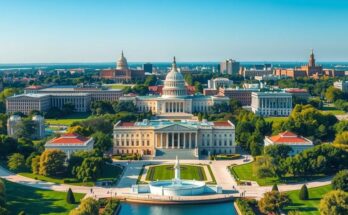The Nigerian government has proposed a ₦54.99 trillion budget for 2025, eliciting mixed reactions. A survey revealed that many view the budget as risky, emphasizing the importance of proper fund management. Concerns about healthcare funding, reliance on borrowing, and low confidence in economic impact were prevalent. Respondents suggested improving transparency, accountability, and exploring diverse revenue sources to ensure effective budget implementation.
The Nigerian government has proposed a 2025 budget of ₦54.99 trillion. Public opinion reflects a split on this decision. A recent TalkExchange poll revealed that 50% of respondents perceive it as a risky move, concerned it may lead to increased borrowing and a potential debt crisis. Conversely, 30.8% believe the outcome hinges on how effectively the funds are allocated, and 15.4% view the budget as a sign of commitment to national development.
Concerns primarily center on the government’s reliance on borrowing. When questioned about sustainability, 42.3% indicated that wise fund utilization could positively impact the economy. In contrast, 30.8% warned that this approach might exacerbate existing debt and financial challenges. An additional 23.1% considered the strategy sustainable only if revenue generation improves, while 3.8% were uncertain.
The budget’s allocation for healthcare includes ₦200 million aimed at supplementing shortfalls in U.S. health aid. However, 46.2% of the public believe this sum is inadequate for the health sector’s demands, whereas 42.3% assert that the effectiveness of such funding is contingent on proper management. Only a small fraction, 7.7%, regard it as a meaningful investment, with 3.8% expressing uncertainty.
There is a lack of confidence regarding the budget’s efficacy in addressing economic issues. Only 7.7% of Nigerians expressed strong confidence, 15.4% displayed some confidence, while 46.2% had little confidence, and 30.8% were entirely unconvinced. When asked about prioritization in funding, 46.2% favored infrastructure development, followed by 26.9% for education and 23.1% for healthcare. Security received minimal support, with only 3.8% advocating for its funding increase.
The anticipated impact of the budget on Nigeria’s economy raises significant apprehensions. While 19.2% foresee economic growth, and 11.5% expect enhanced public services, a majority of 57.7% worry that it may lead to increased national debt and financial instability. Some respondents forecast rising inflation and higher living costs, representing 11.5% of the opinions.
Revenue generation independent of borrowing remains a critical topic. Acknowledging some government efforts in taxation, 23.1% of participants believe more initiatives are necessary to support local industries. Conversely, 38.5% indicate that existing efforts are insufficient and have yet to produce significant outcomes, with no uncertainty among respondents.
Suggesting ways for the government to address economic challenges effectively, respondents called for enhanced transparency, accountability, and prudent expenditure. Common recommendations included reducing unnecessary costs linked to government operations and curbing political office spending.
One respondent noted, “To ensure the increased budget effectively tackles Nigeria’s economic challenges, the government must enhance transparency and accountability to prevent fund mismanagement while prioritising key sectors like infrastructure, power, agriculture, and manufacturing to drive growth.” Additionally, there were calls to “address bureaucratic inefficiency and waste; reduce the number of agencies and government bodies; seriously tackle corruption; cut down on government excesses.”
The need to diversify revenue streams beyond oil was also emphasized, with suggestions to explore sectors such as solid minerals, fintech, and tourism. One individual remarked, “Expanding revenue sources beyond oil through improved tax collection, solid minerals, fintech, and tourism will create sustainable funding.”
Concerns regarding inflation management, exchange rate stability, and improved debt management were frequently mentioned. One participant reflected, “Inflation and exchange rates are being effectively controlled. I see better days ahead in Nigeria.” Another underscored the necessity for the government to reduce extravagant spending and financial misconduct, stating, “They should cut down their luxury spending and looting of Nigeria’s treasury. They should sacrifice also.”
In conclusion, the proposed ₦54.99 trillion budget for 2025 has stirred varied public opinion among Nigerians, with concerns over reliance on borrowing and the effectiveness of fund allocation dominating the discourse. A significant portion of the population expresses skepticism regarding the budget’s potential to address economic challenges effectively, emphasizing the need for improved transparency, accountability, and diversification of revenue sources. Overall, proactive measures are necessary for sustainable economic growth and stability.
Original Source: businessday.ng




